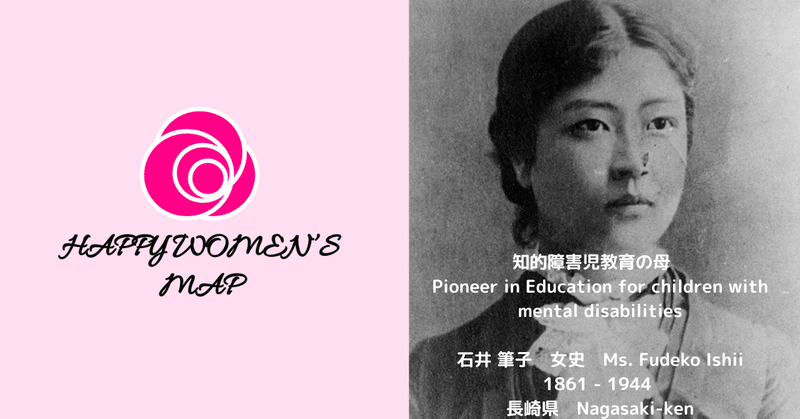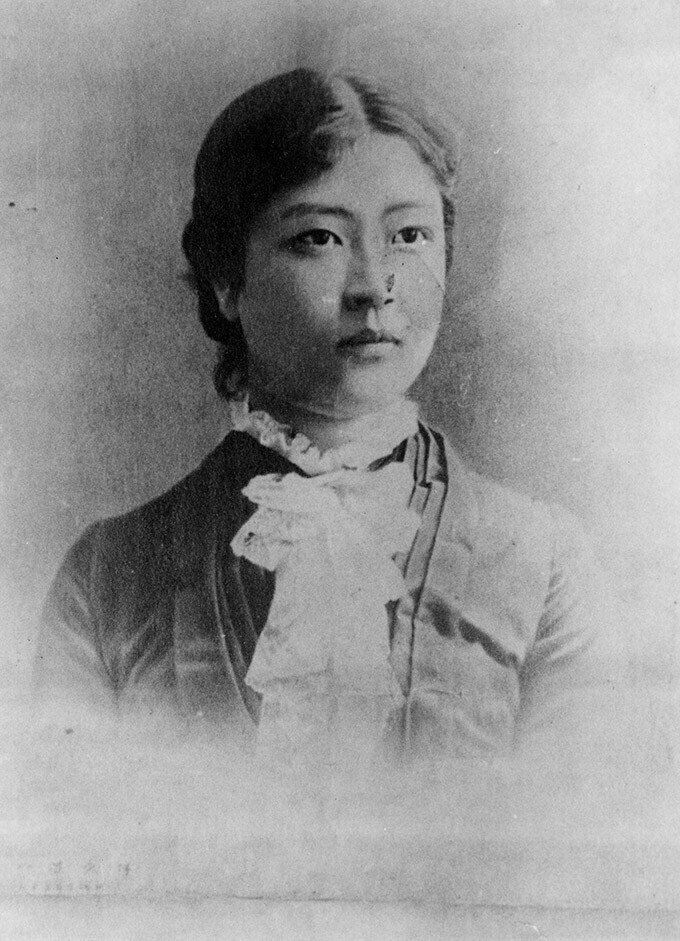
Happy Women's Map 長崎県 知的障がい児教育の母 石井 筆子 女史 / Pioneer in Education for children with mental disabilities, Ms. Fudeko Ishii

「いばらの路を知りて捧げし身にしあればいかで撓(たわ)まん撓(たわ)むべきかは」
"Having known the thorny path and dedicated oneself, how should one not bend or yield?"
石井 筆子 女史
Ms. Fudeko Ishii
1861 - 1944
長崎県大村市 生誕
Born in Omura-City, Nagasaki-ken
石井 筆子女史は、知的障がい児教育の創始者です。夫・亮一とともに日本初の知的障がい児教育福祉施設として滝乃川学園の運営に尽力しながら、知的障害児童ひとりひとりの可能性を育てようと献身しました。
Ms. Fudeko Ishii is the founder of education for children with intellectual disabilities. Along with her husband, Ryoichi, she worked hard to run Takinogawa Gakuen, Japan's first educational and welfare facility for children with intellectual disabilities. She dedicated to nurturing the potential of each and every child with intellectual disabilities.
*******
「鹿鳴館の華」
筆子は、長崎県大村市に大村藩士の父・渡辺清と母・ゲンの3人きょうだいの長女として生まれます。父・清は江戸無血開城の立役者であり、明治新政府の元で福岡県令や元老院議官等を歴任。筆子11歳の時に家族そろって東京で暮らしはじめます。筆子は、日本初の官立女子校である東京女学校に第一期生として入学。貴族・華族・大金持ちの子女らと、英語はじめ生物学・物理学・化学・歴史学など当時最先端の教養を外国人教師から学びはじめるも、高額な授業料による財政難で廃校になります。向学心に燃える筆子は、勝海舟の屋敷内でアメリカ人教師・ウィリアム・ホイットニーの娘クララから英語を習います。筆子は18歳で元アメリカ大統領グラント将軍を父・清とともにもてなして華々しく外交デビュー、さらに翌年には皇后の命で津田梅子らと共に日本初の女子海外留学生として渡欧。筆子は市民革命による「自由、平等、博愛」を正式な国の標語にしたばかりのフランスで、最先端の人権思想・女子教育・慈善福祉事業などを嬉々として学びます。帰国後は華族女学校のフランス語教師として教鞭を執りながら、貧困家庭の女子を職業訓練する大日本婦人教育会付属女紅女学校の開校に従事。一方、鹿鳴館にの宴会に度々出かけ、袴をドレスにアレンジして華を添えながら英語・フランス語・オランダ語を駆使して外交人を接待します。
「鴿、足を止める処なく舟に還る」
23歳の筆子は父の勧めで元大村藩家老の長男・小鹿島果と結婚。夫の理解のもと、華族女学校での教師を続けます。まもなく長女・幸子が生まれるも、医師から知的障がいを示唆されます。突然の不幸に打ちのめされた筆子は母子でキリスト教の洗礼を受けて幸子の成長を見守ります。やがて次女・恵子が誕生するも虚弱児で生後すぐに亡くなり、まもなく三女・康子を授かるも結核性脳膜炎にかかって知能と身体に障害が残ります。さらに翌年には夫・果が35歳の若さで逝去。31歳で2人の障害児を抱え未亡人となった筆子はますます信仰を篤くし、聖公会のミッションスクール・静修女学校の校長に就任します。昼間は華族女学校に勤め、朝夕は静修女学校で寄宿生とともに過ごします。一方、筆子の知的障害を持つ娘達は「白痴」と称され教育の対象外とされることに筆子は悩みます。生徒数名から40人以上に成長させた頃、石井亮一が講師としてやってきます。濃尾震災で孤児となった女児を保護するために「弧女学院」を設立する亮一に筆子は大いに共感、華やかな人脈を活かしたバザーを主催して寄付金を集めて経営難を助けます。その中で長く病床にあった3女・康子が死去、悲しみに暮れる筆子に亮一は知的障がい児童のための教育福祉施設の構想を打ち明けます。筆子は亮一の斬新な発想の取り組みに共感、気力を奮い立たせるようにして亮一のアメリカ留学を支援、アメリカ・デンバー市開催の婦人倶楽部万国大会に日本婦人代表として出席、亮一と一緒にアメリカの女学校はじめ孤児院・身体障がい児の学校・身体障がい者のための社会福祉施設などを見学してまわります。
「いばらの路」
帰国した筆子は華族女学校を退官、静修女学校の校舎と生徒を津田梅子に譲り、親族の反対を押し切って42歳で亮一と再婚します。夫婦で知的障がい児のための専門教育機関・滝乃川学園を開所、2人三脚で運営・経営にあたります。 亮一は国内外での研究活動や講演活動等で不在が多く、筆子が実質的な責任者として財源確保・安定経営にあたります。はじめに筆子は、貧しい女性たちに教育を授けて自立させるため学園内に保母養成部を創設、華族女学校の教え子らと共に英語・歴史・習字・裁縫などを教え、卒業後は学園内で保母として採用します。次に、筆子は農園整備を目指して農作業部を開設、養蚕・花つくり・わさび・奈良漬けなどを製造販売したり、バザーに励みます。さらに筆子はアンデルセン童話を翻訳したり本を執筆します。筆子は寮母として熱心に園児ひとりひとりの状況を細かく理解して養護と指導にあたり、園児や保母から「お母様」と呼ばれ信頼を深めます。学園の子供たちが日々成長していく様子を驚きと喜びとともに見守る中、筆子55歳のときに長女・幸子が逝去します。筆子は気力を奮い起こして巣鴨移転にあたる最中、園児の火遊びが原因で火災が発生、炎に飛び込んで足に怪我を負いながら園児を探し求めるも、6名の生徒が焼死します。監督責任また賠償問題がのしかかり、筆子と亮一は学園の閉鎖を決意します。ところが、新聞報道されるやいなや華族女学校で筆子に学んだ貞明皇后はじめ華族・財閥ならびに全国から励ましの手紙と義援金が寄せられます。2人は学園の再興を決意、半年後には財団法人の認可を受け、理事長に渋沢栄一を据え、空気の澄んだ国立市で学園を再開します。昭和恐慌の財政難の中で夫・亮一が70歳で死去すると、筆子は脳溢血の後遺症で半身不随の身を押しながら76歳で第2代学園長に就任します。まもなく戦争による飢えまた空襲で幾人もの生徒また教職員が命を落とす中、筆子は学園の将来を案じながら83歳で死去します。「たくさんの命が手のひらからこぼれていきました。どうして守ってあげられなかったのか。どうかお許し下さい」。
"Rokumeikan's Blossom"
Fudeko is born as the eldest of three siblings to her father, Kiyoshi Watanabe, a retainer of the Ōmura clan, and her mother, Gen, in Ōmura, Nagasaki. Her father, Kiyoshi, played a significant role in the peaceful surrender of Edo during the Meiji Restoration and went on to hold various positions in Fukuoka Prefecture and the Meiji government, including the Elder Statesmen's Council. When Hitsuji was 11 years old, the family moved to Tokyo. Fudeko became part of the first cohort of students at Tokyo Women's School, the first official girls' school in Japan. She studied a wide range of subjects, including English, biology, physics, chemistry, and history, under the guidance of foreign teachers. The school, due to its high tuition fees, was accessible only to children of nobility, aristocrats, and the wealthy, leading to its eventual closure due to financial difficulties. Fudeko learned English from Clara Whitney, the daughter of American teacher William Whitney, at the residence of Katsu Kaishū. At the age of 18, Fudeko, along with her father Kiyoshi, hosted a grand diplomatic event for General Ulysses S. Grant, the former President of the United States. The following year, upon the request of the Empress, she traveled to Europe with Umeko Tsuda and others as Japan's first female overseas exchange student. In France, where the official motto of the country had just been changed to "Liberty, Equality, Fraternity" due to the civil revolution, she learned about cutting-edge human rights ideas, women's education, and charitable welfare activities. After returning to Japan, she worked as a French teacher at a school for aristocratic girls while actively contributing to the opening of a school for girls in poor households known as the Dai-Nippon Women's Education Association. At the nightly banquets at Kanamega-kan, she entertained diplomats by elegantly arranging her kimono as a dress and conversing with them in English, French, and Dutch.
"Pigeons Return to the Boat without a Place to Rest"
At the urging of her father, 23-year-old Fudeko married Kajima Oga, the eldest son of a former chief retainer of the Omura clan. With her husband's understanding, she continues to teach at the Chinese Girls' School. She soon gives birth to her first daughter, Sachiko, but her doctor suggests that she has an intellectual disability. Devastated by her sudden misfortune, Fudeko watches over Sachiko's growth as her mother and child are baptized into Christianity. She eventually gave birth to her second daughter, Keiko, but she was a frail baby and died soon after birth.She soon gave birth to her third daughter, Yasuko, but she contracted tuberculous meningitis and was left with intellectual and physical disabilities. . Furthermore, the following year, her husband Ka passed away at the young age of 35. Fudeko, who became a widow at the age of 31 with two children with disabilities, became more and more devoted to her faith, and she became the principal of the Anglican mission school, Shizuka Girls' School. During the day, she works at the Peerage Girls' School, and in the mornings and evenings, she spends her time at the Seishin Girls' School with her boarders. On the other hand, Fudeko worries that her daughters with intellectual disabilities are called "idiots" and excluded from education. When she had grown from a few students to over 40, Ryoichi Ishii came to teach her. Fudeko sympathizes with Ryoichi, who is establishing ``Aku Jogakuin'' to protect girls orphaned by the Nobi Earthquake, and uses his network of connections to host a bazaar to collect donations and help with financial difficulties. Masu. During this time, their third daughter, Yasuko, who had been in bed for a long time, dies, and Ryoichi confides in Fudeko, who is grieving, his idea for an educational and welfare facility for children with intellectual disabilities. Fudeko empathizes with Ryoichi's innovative ideas and motivates him to study abroad in the United States. She attends the Women's Club International Convention held in Denver, USA as a Japanese women's representative, and joins Ryoichi to study abroad in the United States. We will tour girls' schools, orphanages, schools for children with physical disabilities, and social welfare facilities for people with physical disabilities.
"Thorny Road"
After returning to Japan, Fudeko retired from Peerage Girls' School, handed over the school building and students to Tsuda Umeko, and, despite the opposition of her relatives, remarried Ryoichi at the age of 42. The couple opened Takinogawa Gakuen, a specialized educational institution for children with intellectual disabilities, and worked together to manage and operate it. Ryoichi is often absent due to research and lecture activities both domestically and internationally, and Fudeko is in charge of securing financial resources and ensuring stable management. First, Fudeko established a daycare training club within the school in order to educate poor women and help them become independent. She taught English, history, calligraphy, sewing, etc. with the students of the peerage girls' school, and after graduating, she worked as a daycare worker at the school. will be adopted as Next, Fudeko opened an agricultural work department with the aim of improving the farm, and she worked hard at the bazaar, producing and selling products such as sericulture, flower making, wasabi and narazuke. She also translates Andersen's fairy tales and writes books. As Fudeko's dorm mother, she passionately understands each child's situation in detail and provides care and guidance.The children and daycare workers call her ``Mother,'' and the trust in her deepens. While she watched with wonder and joy as the children at the school grew day by day, her eldest daughter, Sachiko, passed away when she was 55 years old. While Fudeko musters up her willpower to move to Suga, a fire breaks out due to her kindergarteners playing with fire, and although she jumps into the flames and injures her leg, she tries to find her kindergartener, but six students... is burned to death. As the issue of supervisory responsibility and compensation looms large, Fudeko and Ryoichi decide to close the school. However, as soon as the news was reported in the newspapers, letters of encouragement and donations began to pour in from Empress Teimei, who had studied under Fudeko at a girls' school for the nobility, from the nobility and financial groups, and from all over the country. The two decided to revive the school, and after six months, they received approval from a foundation, installed Eiichi Shibusawa as the chairman, and reopened the school in the clean air of Kunitachi City. When her husband, Ryoichi, passed away at the age of 70 amidst the financial difficulties of the Showa Depression, Fudeko became the school's second principal at the age of 76, despite being partially paralyzed due to the aftereffects of a cerebral hemorrhage. Fudeko died at the age of 83, worrying about the school's future as many students and staff soon died from starvation and air raids during the war.
"So many lives were spilled from the palm of my hand. Why couldn't I have protected them? Please forgive me."
-大村市 Omura city
-滝乃川学園 Takinokawa Gakuen

Share Your Love and Happy Women's Story!
あなたを元気にする女性の逸話をお寄せください!
Share your story of a woman that inspires you!
この記事が気に入ったらサポートをしてみませんか?
